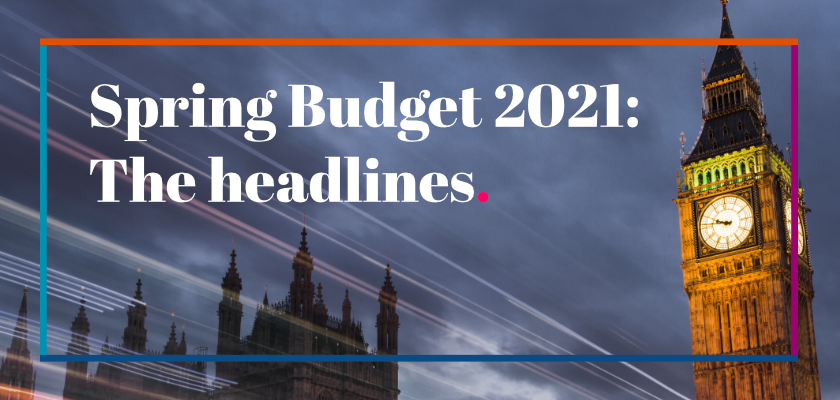TaxCalc Blog
News and events from TaxCalc
Spring Budget 2021: The headlines

Here are some key takeouts from Chancellor Rishi Sunak’s economic plan to help the UK's recovery from the COVID pandemic:
For businesses and employers
-
An extension of the Coronavirus Job Retention Support Scheme (CJRS)to September 2021 across the UK. The scheme will remain unchanged until July when the government will ask businesses to provide a 10% contribution to employees’ pay, which will rise to 20% in August and September.
-
Small and medium-sized employers in the UK will continue to be able to reclaim up to two weeks of eligible Statutory Sick Pay (SSP) costs per employee from the Government.
-
An extension of the UK-wide Self Employment Income Support scheme (SEISS) to September 2021. The fourth SEISS grant, which will be open for claims in April, will be worth 80% of trading profits, covering February, March and April and capped at £7,500. There will be a fifth and final SEISS grant covering May to September, which will be linked to turnover. Where turnover has fallen by 30% or more, the grant will be 80% of trading profits, capped at £7,500. Where turnover has fallen by less than 30%, the grant will be worth 30% of profits, capped at £2,850. This final grant will be open for claims in late July. For both grants, unlike the previous ones where a tax return must have been filed for 2018/19 to apply, those who’ve filed a 2019/20 return may also be eligible.
-
The rate of Corporation Tax will increase to 25% from 2023. Businesses with profits of £50,000 or less will continue to be taxed at 19% and a taper above £50,000 will be introduced so that businesses with profits greater than £250,000 will be taxed at the full 25% rate.
-
Restart Grants will be brought into play in April, following the end of existing grant programmes in March. Non-essential retailers, which will open first, will receive grants of up to £6,000 per premise; hospitality and leisure business, which will open later and be more heavily impacted by restrictions, will be able to claim up to £18,000.
-
A UK-wide Recovery Loan Scheme will replace the Coronavirus Business interruption Loans Scheme (CBILS). Through to the end of 2021, businesses of any size can apply for loans from £25,000 to £10 million and the Government will provide a guarantee for 80% to lenders.
-
The Government will extend the temporarily reduced rate of VAT of 5% for hospitality, holiday accommodation, and attractions until 30 September 2021. This will be followed by the introduction of a new reduced rate of 12.5% from 1 October 2021 that will be in effect until 31 March 2022 at which point it will revert to the standard rate.
-
Business rates relief gives eligible business property with values below £51,000 100%. Pubs with a value below £100,000 will get a £5,000 discount. In recognition of the fact many small businesses occupying very small properties pay little or no business rates due to Small Business Rates Relief (SBRR) the Government is also providing £2.2 billion of funding to local authorities in England to distribute as grants of £3,000 to around 700,000 businesses currently eligible for SBRR or Rural Rate Relief.
-
Extension of the apprenticeship hiring incentive in England to September 2021 and an increase of payment to £3,000.
-
The availability of incorporated and unincorporated businesses to carry-back trading losses up to three years (rather than just one) will be extended. A maximum of £2,000,000 of unused trading losses made in each of the tax years 2020 to 2021 and 2021 to 2022 will apply to unincorporated businesses. For corporations, the £2,000,000 maximum applies separately to unused trading losses in relevant accounting periods ending between 1 April 2020 and 31 March 2021 and between 1 April 2021 and 31 March 2022.
-
Companies investing in qualifying new plant and machinery between 1 April 2021 and March 2023 will benefit from new first-year capital allowances. Investments in main-rate assets will be relieved by a 130% super-deduction, whilst investments in assets qualifying for special rate relief will benefit from a 50% first-year allowance.
-
Eight new English Freeports will be based in East Midlands Airport, Felixstowe & Harwich, Humber, Liverpool City Region, Plymouth, Solent, Thames and Teesside. The Enhanced rate of SBA of 10% will be made available to the designated tax sites for corporation tax and income tax purposes. To qualify, the structure or building must be brought into use on or before 30 September 2026. Stamp Duty Land Tax relief will be made available for purchases of land or property on these areas, subject to that land or property being acquired and used for qualifying purposes and subject to a control period of up to 3 years.
-
New Help to Grow schemes. Help to Grow Digital for small and medium-sized businesses will provide free online technology advice and 50% discounts on approved software. Help to Grow Management Training will also cover areas such as marketing and financial management for these businesses.
For individuals
-
The income tax Personal Allowance and higher rate threshold will be maintained from April 2022 until April 2026. The 2021/22 increase of the Personal Allowance to £12,570 and basic rate limit to £37,700 will be set to remain for 2022/23, 2023/24, 2024/5 and 2025/26. The higher rate threshold will therefore be £50,270 for these years.
-
Inheritance tax thresholds will be maintained at their current levels until April 2026. The nil-rate band will continue at £325,000, the residence nil-rate band will continue at £175,000, and the residence nil-rate band taper will continue to start at £2 million.
-
The Lifetime Allowance will be maintained at its current level of £1,073,100 until April 2026.
-
The adult ISA annual subscription limit for 2021-22 will remain unchanged at £20,000.
-
There will be a six-month extension of the £20 per week Universal Credit uplift in Great Britain, with the Northern Ireland Executive receiving additional funding to match the increase. A one-off payment of £500 will be made to eligible Working Tax Credit claimants across the UK.
-
The stamp duty holiday on properties worth up to £500,000 will be extended from the end of March until the end of June and then there will still be no duty on homes worth up to £250,000 for another three months. After that, the threshold returns to the usual level of £125,000 from October.
-
A new mortgage guarantee scheme will enable all UK homebuyers to secure a mortgage up to £600,000 with a 5% deposit.




